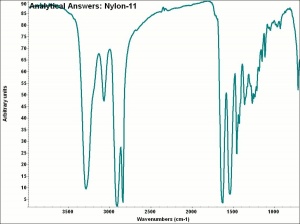Difference between revisions of "Nylon 11"
Jump to navigation
Jump to search
(username removed) |
|||
| (4 intermediate revisions by 3 users not shown) | |||
| Line 1: | Line 1: | ||
== Description == | == Description == | ||
| − | Nylon 11 is composed of polymerized 11-amino-undecanoic acid. Nylon 11 was originally made from [ | + | Nylon 11 is composed of polymerized 11-amino-undecanoic acid. Nylon 11 was originally made from [[castor%20oil|castor bean oil]] and marketed under the trademark of Rilsan®. Nylon 11 fibers have similar properties to nylon 6 and 6,6. Nylon 11, however is less dense, melts at a lower temperature and has better dimensional stability. It is often used for brush bristles, lingerie, bulked yarns, and injection molded plastics. |
| − | |||
| − | |||
| + | See also [[nylon%20fiber|nylon fiber]]. | ||
| + | [[[SliderGallery rightalign|aaiNYLON-11.jpg~FTIR]]] | ||
== Synonyms and Related Terms == | == Synonyms and Related Terms == | ||
| − | PA11; polyamide 11; polyundecanamide; | + | PA11; polyamide 11; polyundecanamide; Nylon® [Du Pont]; Rilsan® [Arkema]; Rilsanite® |
| − | |||
| − | |||
| − | |||
| − | |||
| − | |||
| − | |||
| − | |||
| − | |||
| − | |||
| − | |||
| − | |||
| − | |||
| − | |||
| − | |||
| − | |||
| − | |||
| − | |||
| − | + | ==Physical and Chemical Properties== | |
| − | == | + | * Resistant to alkalis and most organic solvents. Degraded by concentrated acids and phenol. |
| + | * Burns with yellow-orange flame and blue smoke; smells of burnt horn. | ||
| + | * Fiber is smooth. | ||
| + | * Cross section is circular. | ||
| + | * Tenacity = 5.0-7.5 g/denier (dry or wet); | ||
| + | * Elongation = 25% (dry or wet); | ||
| + | * Moisture regain = 1.18% | ||
| + | * Melting Point = 189 C | ||
| + | * Density = 1.04 g/ml | ||
| − | + | ==Resources and Citations== | |
| − | * | + | * G.S.Brady, ''Materials Handbook'', McGraw-Hill Book Co., New York, 1971 Comment: p. 553 |
| − | * | + | * Richard S. Lewis, ''Hawley's Condensed Chemical Dictionary'', Van Nostrand Reinhold, New York, 10th ed., 1993 |
| − | * | + | * Marjory L. Joseph, ''Introductory Textile Science'', Holt, Rinehart and Winston, Fort Worth, TX, 1986 |
| − | * | + | * J.Gordon Cook, ''Handbook of Textile Fibres:II Man-made Fibres'', Merrow Publishing Co. , Durham, England |
| − | * | + | * F. Kidd, ''Brushmaking Materials'', Bristish Brush Manufacturers, London, 1957 |
[[Category:Materials database]] | [[Category:Materials database]] | ||
Latest revision as of 13:53, 19 October 2022
Description
Nylon 11 is composed of polymerized 11-amino-undecanoic acid. Nylon 11 was originally made from castor bean oil and marketed under the trademark of Rilsan®. Nylon 11 fibers have similar properties to nylon 6 and 6,6. Nylon 11, however is less dense, melts at a lower temperature and has better dimensional stability. It is often used for brush bristles, lingerie, bulked yarns, and injection molded plastics.
See also Nylon fiber.
Synonyms and Related Terms
PA11; polyamide 11; polyundecanamide; Nylon® [Du Pont]; Rilsan® [Arkema]; Rilsanite®
Physical and Chemical Properties
- Resistant to alkalis and most organic solvents. Degraded by concentrated acids and phenol.
- Burns with yellow-orange flame and blue smoke; smells of burnt horn.
- Fiber is smooth.
- Cross section is circular.
- Tenacity = 5.0-7.5 g/denier (dry or wet);
- Elongation = 25% (dry or wet);
- Moisture regain = 1.18%
- Melting Point = 189 C
- Density = 1.04 g/ml
Resources and Citations
- G.S.Brady, Materials Handbook, McGraw-Hill Book Co., New York, 1971 Comment: p. 553
- Richard S. Lewis, Hawley's Condensed Chemical Dictionary, Van Nostrand Reinhold, New York, 10th ed., 1993
- Marjory L. Joseph, Introductory Textile Science, Holt, Rinehart and Winston, Fort Worth, TX, 1986
- J.Gordon Cook, Handbook of Textile Fibres:II Man-made Fibres, Merrow Publishing Co. , Durham, England
- F. Kidd, Brushmaking Materials, Bristish Brush Manufacturers, London, 1957
